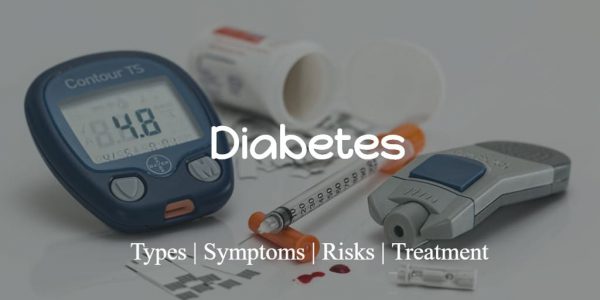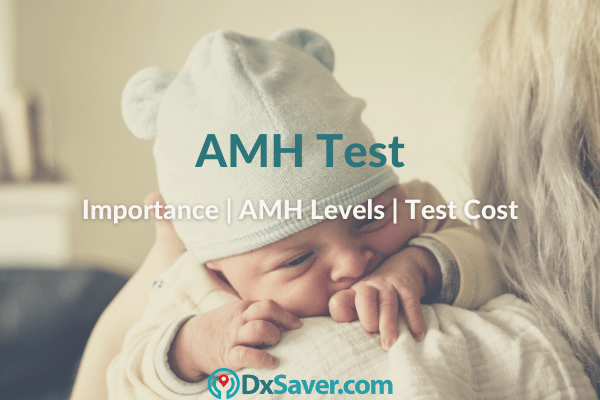
Anti-Mullerian Hormone (AMH) test is a blood test ordered by your doctor or physician to measure the level of AMH hormone in the blood. This test is done to assist the reproduction procedures such as IVF (In-vitro Fertilization). The level of anti-Mullerian hormone in the blood determines the ovarian reserve in a woman.
The article below covers all the important topics of anti-Mullerian hormone tests like the AMH test cost, what is an Anti-Mullerian Hormone test, anti-Mullerian hormone levels, normal levels of AMH, AMH levels by age, test procedure, AMH home test kit, preparation, risks, and provider locations.
- Anti-Mullerian Hormone (AMH) test cost.
- What is an Anti-Mullerian Hormone test?
- Why is an AMH test done?
- Who is recommended for an AMH test?
- How is the Anti-Mullerian Hormone test done?
- AMH home test kit.
- Is there any preparation required before the test?
- Are there any risks in the test?
- What does the test result mean?
- Normal AMH levels.
- AMH Levels by age
- How to treat high and low AMH levels?
- Provider Locations.
For our readers, who are more interested in knowing the AMH test cost beforehand, we begin with that section.
How much does the Anti-Mullerian test cost?
Anti-Mullerian hormone (ovarian reserve) test costs $95 in the U.S. The cost of an AMH test also depends on your choice of visiting the nearest lab or getting tested at home using the AMH home test kit. Complete the procedure and get the results in your email in 2 to 3 business days. Doctor consultation is also available for further treatment or any kind of medical advice.
The following table shows the AMH home test kit cost and the test cost at 2 of our partner laboratories (CLIA – Certified) network located across the U.S.
Name of our Partner Labs | Book Online |
LetsGetChecked(Home Test Kit)
| Offer Price$99 |
Personal Testing Lab
| Offer Price$95 |
AMH test cost with insurance
Many health insurance policies in the U.S. cover the cost of the Anti-Mullerian Hormone test for women when it is done as a part of a fertility evaluation. When it is done as a separate test, they might consider the reason for the test. However, the coverage of private health insurance companies and national health insurance programs like Medicare and Medicaid varies widely. So we recommend you to check the coverage of your health insurance plan before getting tested.
Our AMH testing providers do not accept any health insurance. But, on request, they can provide you with an itemized receipt containing all the details like the name and code of the test, and CPT code that is necessary for insurance reimbursement purposes.
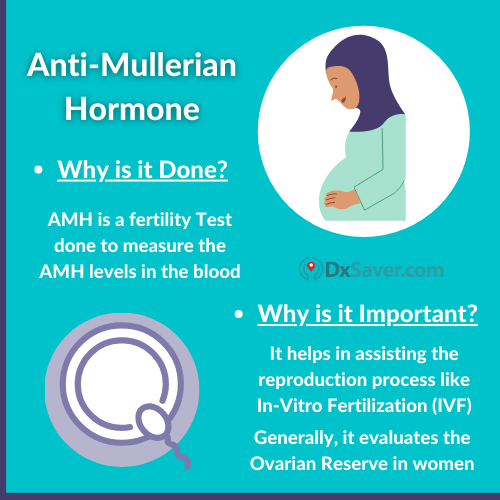
What is an Anti-Mullerian Hormone?
Anti-Mullerian Hormone is also generally known as AMH. Anti-Mullerian is a hormone produced by the reproductive tissues in both men and women. This hormone is responsible to develop the eggs produced by the ovary in women to get pregnant and determines the ovarian reserve. In simple words, the level of the Anti-Mullerian hormone tells the number of follicles in the ovaries.
Infertility is very common in the U.S. According to the Centers for Disease Control and Prevention (CDC), about 4 million births per year in the United States are via IVF. AMH test determines the ovarian reserve and helps to assess the IVF treatment probability of success. So, we highly recommend you to get tested for AMH levels if you are planning for a baby or undergoing an IVF procedure.
Why is an AMH test done?
Anti-Mullerian Hormone blood test is a fertility assessment test done to measure the level of AMH in the blood and to assist the reproduction procedures such as IVF. It is also used as a tumor marker for ovarian cancer. Generally, in women, it is done to evaluate the ovarian reserve and to know the cause of reduced egg count. It also examines the functioning of the ovaries and predicts the possible menopause. It is also done to evaluate the polycystic ovarian syndrome (PCOS) and the effectiveness of ovarian cancer treatment.
Who is recommended for an Anti-Mullerian Hormone test?
Your physician may ask you to take the AMH test if you experience any symptoms of polycystic ovarian syndrome (PCOS) such as
- Enlargement of ovaries
- Change in the breast size
- Delayed or absent of menstrual cycle (amenorrhea)
- Acne
- Abnormal bleeding outside of the menstrual period
- Loss or gain in weight
In an infant, the Anti-Mullerian hormone test is done to evaluate the presence of external sex organs that are not male or female. In an infant boy, it is done to assess the functioning of the testicles.
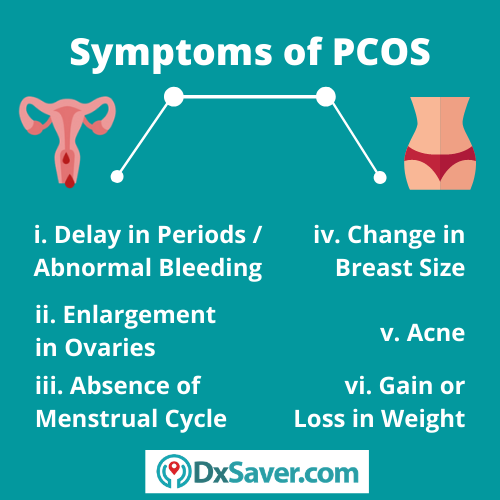
How is the Anti-Mullerian Hormone test done?
Anti-Mullerian Hormone test can be done using the blood sample either by visiting the nearest lab or by using the AMH home test kit.
During this test, a lab technician or a phlebotomist will cleanse the area to be injected with an antiseptic liquid and wrap an elastic band around the upper arm to make the vein visible and swell with blood. He/she then injects a needle to draw a sample of blood and collects the sample in a test tube. After the blood is drawn, he/she covers the injected area with a band-aid or a cotton ball to stop bleeding. The blood sample is then sent to the lab for further analysis.
It takes less than 5 to 10 minutes to perform this test.
Anti-Mullerian Hormone home test kit
Anti-Mullerian Hormone home test kits are mostly preferred by people who are not convenient in commonplace or who do not have time to visit the lab. One of our Anti-Mullerian Hormone testing providers offers the AMH home test kit. You can order the test kit online and take the sample of your blood read the instructions carefully mentioned in the kit and then post it back. The results will be personally emailed to you within 2 to 5 days depending upon the receipt of the sample by the lab.
Is there any preparation required before the test?
There is no special preparation required for the Anti-Mullerian Hormone blood test. You can continue to have a normal diet and carry on with your regular activities.
Are there any risks in the test?
There are no possible risks or complications in taking the Anti-Mullerian Hormone blood test. After the blood sample is drawn, you might feel dizziness, slight pain, bruise, or redness in the injected area for a very little period. If you have any abnormal bleeding in the injected area, inform your physician immediately.
What does the test result mean?
If the AMH levels are lower than normal, it indicates the possibility of a low number of eggs, low fertility level, the onset of menopause, and premature ovarian failure. The normal AMH levels indicate a normal ovarian reserve and tell a woman that she has no problem getting pregnant. Consult your physician for further examinations when you have normal AMH levels and still face difficulties in getting pregnant.
On the contrary, the increased Anti-Mullerian Hormone levels indicate the possibility of PCOS (polycystic ovarian syndrome).
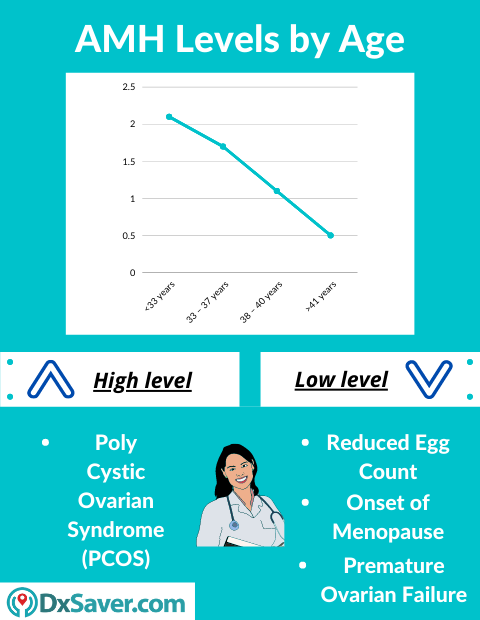
Normal levels of AMH
The normal AMH levels in the blood depend on the age of the woman. In general, the normal level of Anti-Mullerian hormone in a fertile woman range between 1.0 and 4.0 ng/ml (nanograms per milliliter).
AMH Levels by age
Generally, Anti-Mullerian Hormone levels decrease as women age. The following table depicts the AMH levels in the woman as they age
Age group | AMH Levels by age |
| <33 years / Below 33 years | AMH Level = 2.1 ng/ml |
| 33 – 37 years | AMH Level = 1.7 ng/ml |
| 38 – 40 years | AMH Level =1.1 ng/ml |
| >41 years / Above 41 years | AMH Level = 0.5 ng/ml |
How to diagnose high and low AMH levels?
Low levels of AMH can be treated with the following medications and therapies.
- Vitamin D supplements
- L-arginine supplementation
- Abdominal massages to increase blood circulation to the ovaries
- Stress reduction techniques like yoga and meditation
Higher AMH levels can be managed only with a proper diet.
Sometimes, your physician may recommend “Hormone Replacement Therapy”.
In addition to the Anti-Mullerian Hormone test, your physician, if appropriate and necessary, will also order some other blood tests like a Progesterone test, FSH test (follicle-stimulating hormone), LH test (leutinizing hormone), or ultrasound to figure out the problems in pregnancy.
Anti-Mullerian Hormone home test kit
Get your AMH home test kit from LetsGetChecked.
Provider Locations
The Anti-Mullerian hormone test can be done in any of the following locations across the U.S. either by visiting the nearest lab or getting tested at home using the test kit. To know the cost of the AMH test, refer to the first section of the article
- Alabama
- Arizona
- Arkansas
- California
- Colorado
- Connecticut
- Delaware
- Florida
- Hawaii
- Georgia
- Idaho
- Illinois
- Indiana
- Iowa
- Kansas
- Kentucky
- Louisiana
- Maine
- Michigan
- Minnesota
- Mississippi
- Missouri
- Montana
- Nebraska
- Nevada
- New Hampshire
- New Mexico
- North Carolina
- North Dakota
- Oklahoma
- Oregon
- Pennsylvania
- Puerto Rico
- South Carolina
- South Dakota
- Tennessee
- Texas
- Utah
- Vermont
- Virginia
- Washington
- West Virginia
- Wisconsin
- Wyoming
Frequently Asked Questions
Will insurance cover my testing cost?
No, insurance will not be covered in the billing. However, they will provide you a receipt for insurance reimbursement purposes.
How should I book my appointment?
You can choose the most suitable provider from above and make an appointment by following the instructions mentioned by them.
Can I cancel my lab test order?
Yes, you can cancel your lab test order anytime before your testing. A refund will be initiated after deducting the cancellation fee. However, cancellation is at the discretion of the provider.
Do the providers offer result interpretations?
Yes, a few providers may provide doctor consultation who will take you through the results and provide clarification if needed.
How do I receive my report?
To ensure your privacy, the test report will be mailed to you by the provider.
Other topics you may be interested in:-
- At-Home Chlamydia Testing Cost in the US
- Renal Panel (Kidney Function Panel) Test Cost in the U.S.
- HIV Test Cost in the U.S.
- Cost of LDH Test in the U.S.
- How Much Does the Lipid Profile Test Cost in the U.S?
- Cost of Progesterone (Infertility) Test in the U.S.
- D-dimer Blood Test Cost
- What STDs cause Sore Throat?
- Compare Planned Parenthood STD Testing Cost Vs. Other Providers
- Allergy Test Cost in the U.S.
- Why is Gonorrhea STD called “The Clap”?
- Do STDs Spread Via Kissing?
- Causes of Penile Rashes and Other STD Symptoms in Men
- Oral STDs: Names, Symptoms, Treatment and Testing Cost
- Importance of Ferritin Hormone, Normal Levels, Diagnosis & Treatment
- How much does the Mononucleosis (mono) Test Cost in the U.S?






